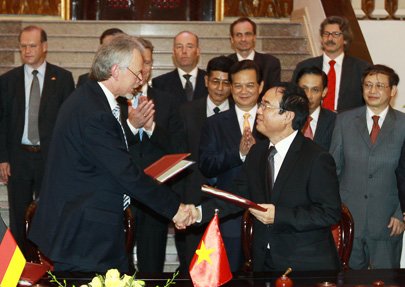
| German bank finances metro project in city | |
HCMC Vice Chairman Nguyen Thanh Tai on Saturday signed a credit agreement with German Reconstruction Bank (KfW), under which KfW would provide nearly 213 million euros for the second metro project in HCMC. The credit agreement was signed in Hanoi under the witness of Prime Minister Nguyen Tan Dung and the visiting German Federal Foreign Minister Guido Westerwelle. The credit agreement was signed just three days after approval from the Prime Minister, allowing the HCMC government and the Finance Ministry to negotiate and sign the credit agreement for the project. On Thursday, this credit agreement came after another financing deal signed between the German lender and the city earlier this year for the project, under which KfW agreed to lend 28 million euros to the city. The loans will be used for developing the second metro route that would start from Ben Thanh Market in downtown HCMC and end at Tham Luong in District 12. The total invested capital for the metro line is estimated at VND23.6 trillion, or some US$1.2 billion. It is to be funded by official development assistance (ODA) loans of the Asian Development Bank, the European Investment Bank, and KfW, as well as the Government budget. The first phase will have a total length of 11.3 kilometers running through districts 1, 3, 10, Tan Binh, and Tan Phu with 11 platforms. It will include a one-kilometer feeder line leading to the Tham Luong Depot, 9.3 kilometers of underground track and almost one kilometer of elevated track. Construction on the first platform of the metro started in District 12 last August. In the second stage, the length of the second metro line will be expanded to 19 kilometers by extending it to both Thu Thiem New Urban Area in the south and An Suong Intersection in the north of the city. Besides the credit agreement for HCMC’s second metro project, the German government on this occasion also signed an agreement to provide 10 million euros for Vietnam’s vocational training program. German Federal Foreign Minister Guido Westerwelle and Vietnam’s Deputy Foreign Minister Pham Binh Minh also hosted a press conference in Hanoi on Saturday after their formal meeting, stressing the two countries’ agreement on promoting bilateral relationship to a strategic partnership, Vietnam News Agency reports. The German minister is cited by te news agency as saying that “Germany is drafting a plan envisioning strategic partnership with Vietnam.” The plan targets the comprehensive cooperation with Vietnam in economy, politics, culture, education, and multilateral relations, he said, but stressed that economic cooperation would be the main pillar in the relationship. On Saturday, the German minister also had a meeting with Prime Minister Nguyen Tan Dung in Hanoi, where the Vietnamese Government leader expected that both countries would push up conditions to that the two sides could sign a strategic partnership agreement when the German Chancellor visits Vietnam later this year. Nguyen Tan Dung also voice’s Vietnam’s support for German to become a permanent member of the expanded United Nations Security Council in the future. | |
| Saigon Times |
